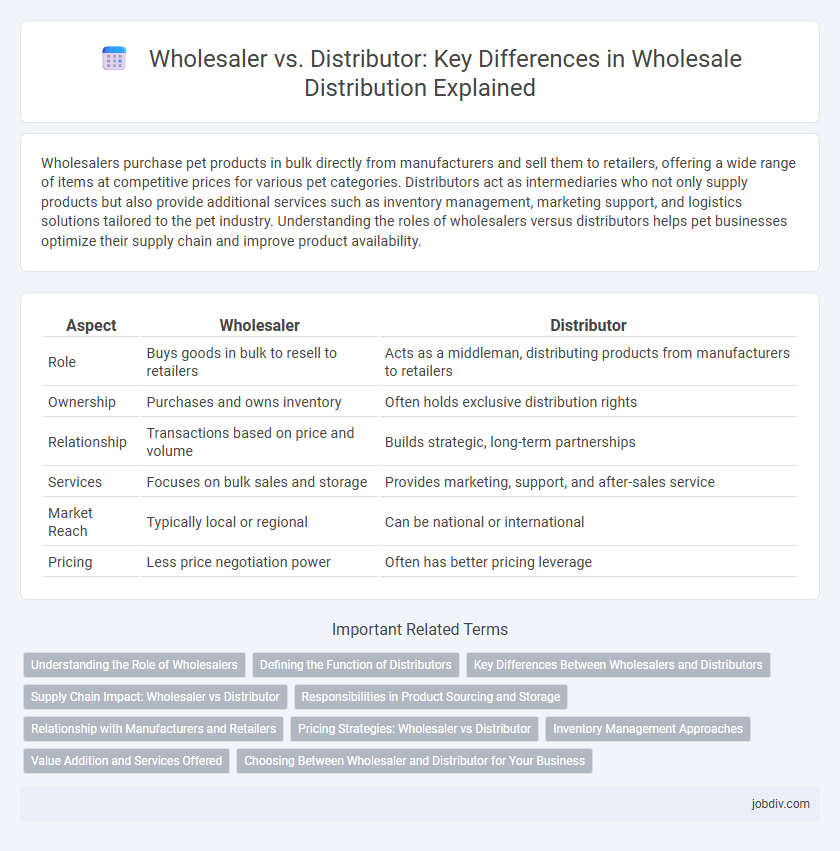Wholesalers purchase pet products in bulk directly from manufacturers and sell them to retailers, offering a wide range of items at competitive prices for various pet categories. Distributors act as intermediaries who not only supply products but also provide additional services such as inventory management, marketing support, and logistics solutions tailored to the pet industry. Understanding the roles of wholesalers versus distributors helps pet businesses optimize their supply chain and improve product availability.
Table of Comparison
| Aspect | Wholesaler | Distributor |
|---|---|---|
| Role | Buys goods in bulk to resell to retailers | Acts as a middleman, distributing products from manufacturers to retailers |
| Ownership | Purchases and owns inventory | Often holds exclusive distribution rights |
| Relationship | Transactions based on price and volume | Builds strategic, long-term partnerships |
| Services | Focuses on bulk sales and storage | Provides marketing, support, and after-sales service |
| Market Reach | Typically local or regional | Can be national or international |
| Pricing | Less price negotiation power | Often has better pricing leverage |
Understanding the Role of Wholesalers
Wholesalers act as intermediaries who purchase goods in bulk from manufacturers and sell them in smaller quantities to retailers, facilitating efficient market reach and inventory management. They provide crucial services such as storage, transportation, and risk-bearing, which help manufacturers streamline operations and reduce logistical burdens. Unlike distributors, wholesalers typically deal with a broader range of products and customers, emphasizing volume sales and market coverage rather than exclusive brand representation.
Defining the Function of Distributors
Distributors act as intermediaries between manufacturers and retailers, managing inventory, sales, and delivery logistics to ensure products reach the market efficiently. They provide value-added services such as product training, marketing support, and after-sales service, which distinguishes them from wholesalers who primarily focus on bulk purchasing and reselling. By maintaining close relationships with both suppliers and customers, distributors play a crucial role in optimizing supply chains and enhancing market reach.
Key Differences Between Wholesalers and Distributors
Wholesalers primarily purchase goods in bulk from manufacturers to sell to retailers or other businesses without altering the products, focusing on inventory management and bulk sales. Distributors maintain closer relationships with manufacturers, often providing additional services such as product promotion, customer support, and delivery logistics, acting as an extension of the manufacturer's sales team. The main differences lie in their roles: wholesalers facilitate bulk resale, while distributors engage in active marketing and supply chain coordination to drive product demand.
Supply Chain Impact: Wholesaler vs Distributor
Wholesalers purchase large quantities of goods from manufacturers and sell them in smaller batches to retailers, optimizing inventory flow and reducing storage costs within the supply chain. Distributors, on the other hand, often provide value-added services such as product customization, marketing support, and technical assistance, which enhance supply chain responsiveness and customer satisfaction. The key supply chain impact difference is that wholesalers primarily focus on bulk redistribution efficiency, while distributors integrate deeper collaboration with manufacturers and end customers to improve overall supply chain agility.
Responsibilities in Product Sourcing and Storage
Wholesalers primarily focus on purchasing large quantities of products from manufacturers to store and sell directly to retailers, managing inventory and warehousing efficiently to meet demand. Distributors often have exclusive agreements with manufacturers, taking on responsibilities like product sourcing, logistics coordination, and sometimes marketing support to ensure products reach target markets. Both roles require robust supply chain management, but distributors typically play a more active role in product sourcing and demand forecasting.
Relationship with Manufacturers and Retailers
Wholesalers purchase products in large quantities directly from manufacturers and sell them to retailers, acting as intermediaries focused on volume sales without altering the product. Distributors maintain closer, more collaborative relationships with manufacturers, often providing added services like marketing, inventory management, and technical support to retailers. This distinction makes distributors more integrated in the supply chain, facilitating smoother communication between manufacturers and retail endpoints.
Pricing Strategies: Wholesaler vs Distributor
Wholesalers typically use volume-based pricing strategies to offer lower per-unit costs by purchasing large quantities, enabling retailers to buy in bulk at discounted rates. Distributors often implement value-based pricing that reflects added services such as delivery, marketing support, and inventory management, resulting in higher prices compared to wholesalers. Understanding these pricing strategies helps businesses choose the optimal supply partner for cost efficiency and service quality.
Inventory Management Approaches
Wholesalers typically maintain extensive inventory to meet immediate bulk purchase demands, emphasizing stock availability and turnover rates to reduce holding costs. Distributors often adopt just-in-time inventory strategies, leveraging close supplier relationships to streamline stock levels and enhance supply chain responsiveness. Optimizing inventory management through real-time data analytics and demand forecasting improves both wholesalers' and distributors' operational efficiency and customer satisfaction.
Value Addition and Services Offered
Wholesalers primarily focus on bulk purchasing and inventory management, offering cost savings through economies of scale and efficient logistics. Distributors add value by providing marketing support, product training, and after-sales services tailored to specific markets, enhancing customer engagement. Both play crucial roles in the supply chain, but distributors typically offer a broader range of services that drive brand growth and customer satisfaction.
Choosing Between Wholesaler and Distributor for Your Business
Choosing between a wholesaler and a distributor impacts your supply chain efficiency and product reach significantly. Wholesalers typically buy in bulk directly from manufacturers to resell to retailers, offering competitive pricing and broad inventory selections. Distributors maintain closer relationships with manufacturers, provide added services like product training and marketing support, and often have exclusive territorial rights, making them ideal for businesses seeking specialized support and consistent supply.
Wholesaler vs Distributor Infographic

 jobdiv.com
jobdiv.com